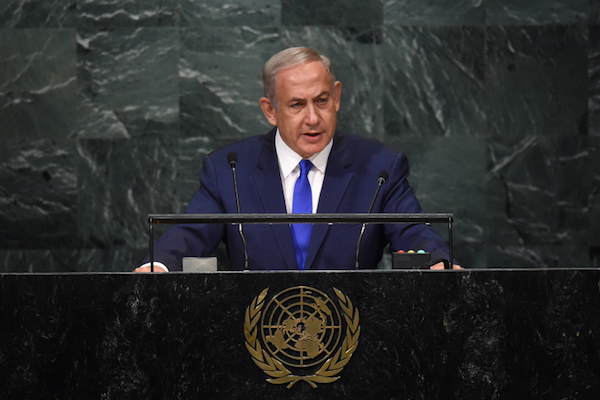The Israeli prime minister tells the UN that he will ‘gladly come to speak’ to the Palestinian legislative body, which he conveniently forgets hasn’t convened in nearly a decade. Outstretched hand for peace or PR ploy?

Israeli Prime Minister Benjamin Netanyahu loves being dramatic at the UN. From his bag of props to awkward moments of silence to general theatrics, he always makes sure to grab a few headlines when visiting the General Assembly in New York.
This year, one of Netanyahu’s biggest moments was when he invited Palestinian President Mahmoud Abbas to speak at the Knesset, Israel’s parliament, an ode to the visit by then Egyptian President Anwar Sadat that preceded a peace deal between the two countries. Netanyahu also offered to speak in front of the Palestinian parliament in Ramallah.
“President Abbas, instead of railing against Israel at the United Nations in New York, I invite you to speak to the Israeli people at the Knesset in Jerusalem,” Netanyahu said, addressing the Palestinian president directly. “And I would gladly come to speak to the Palestinian parliament in Ramallah.”
There are two major problems with Netanyahu’s otherwise seemingly bold step toward peace. There’s no way it would ever happen under current circumstances.
Firstly, as Chaim Levinson pointed out in Haaretz three years ago, when a grandstanding Netanyahu made a similar invitation to Abbas to speak at the Knesset, the Israeli prime minister simply doesn’t have the authority to make such an invitation.
Aside from the fact that he doesn’t have the authority to invite guests to the Knesset, Abu Mazen simply cannot go there. The Knesset Speaker may invite guests with the approval of the Knesset Constitution Committee, but potential invitees include only heads of state, leaders of parliament and the heads of organizations of which Israel is a member (such as the United Nations or the European Union). Israel, ironically, does not recognize Palestine as a state, and doesn’t recognize Abu Mazen as a head of state.
Likewise, the prime minister’s expressed willingness to address the Palestinian parliament in Ramallah is possible only in the fantasy world of UN speeches and public manipulation.
The Palestinian parliament, the Palestinian Legislative Council (PLC), has not convened in almost a decade. It also happens to be controlled by Hamas, which won an unimpeachable majority of seats — 74 of 132 — in the most elections, which were held in 2006. Israel considers Hamas to be a terrorist group, and refuses to recognize the legitimacy of its democratic mandate.
Which is not to say that Israel could not convene a quorum of Palestinian legislators should Netanyahu wish to give an address. In January of last year, Israel was holding a whopping 15 percent (20 legislators) of the entire Palestinian parliament in its prisons, according to prisoners’ rights group Addameer. (As of February 2016, that number was down to six — only 5 percent of the PLC.)

